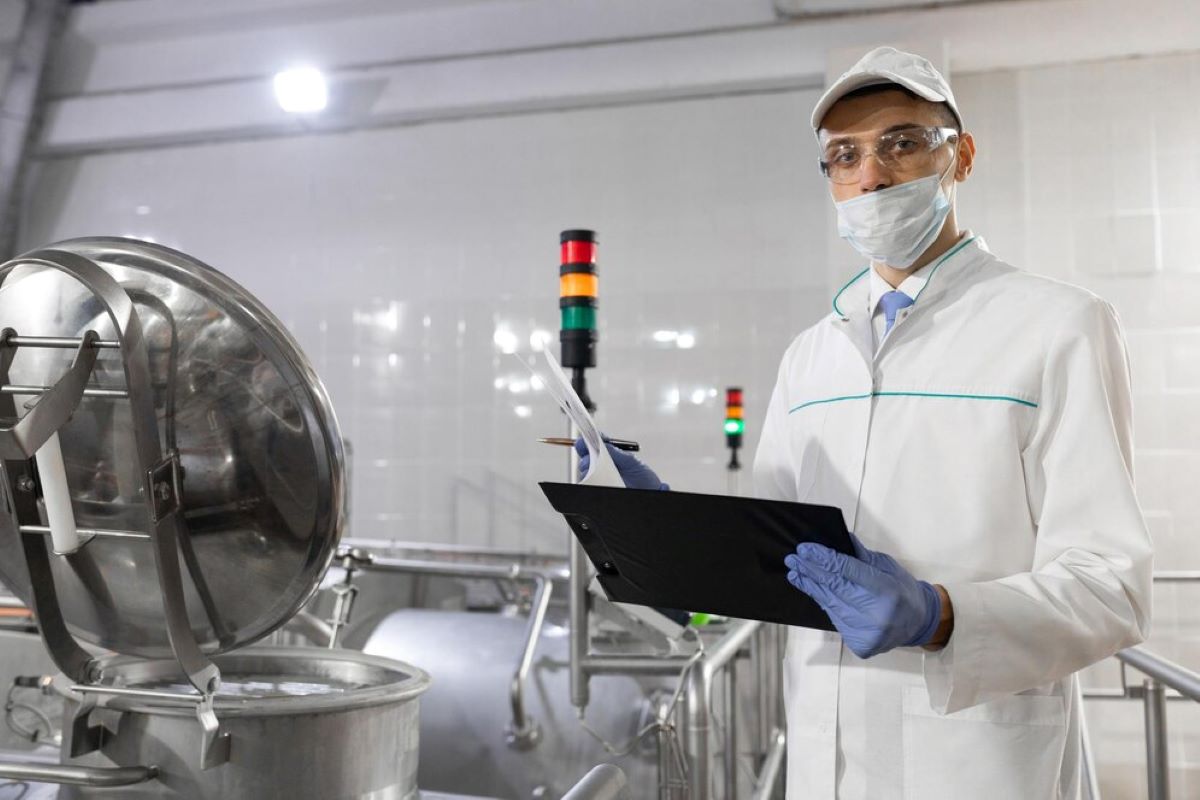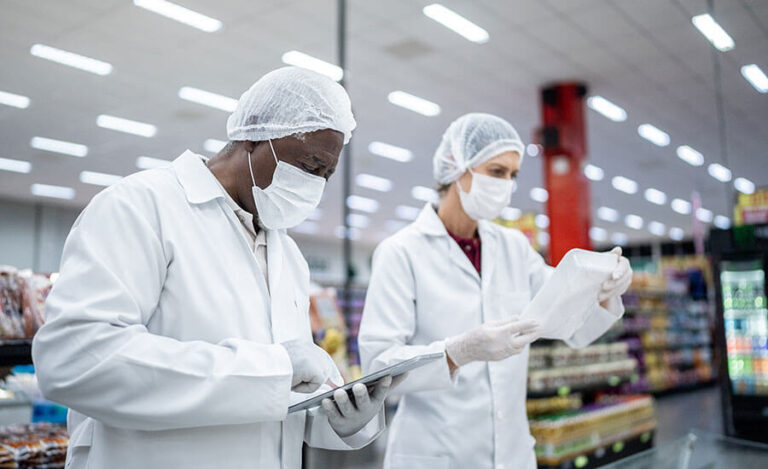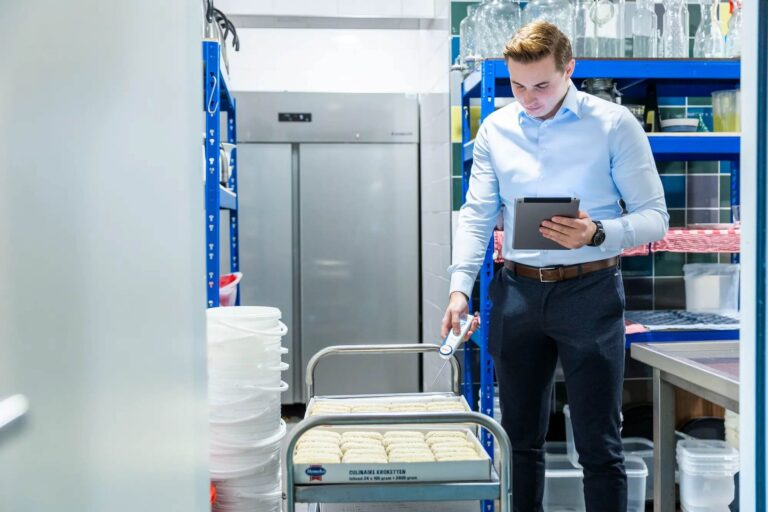What Is Food Safety Compliance Software and Why Do Businesses Need It?
Food safety compliance software is a digital solution that helps businesses manage their food safety responsibilities more efficiently. It replaces traditional paper-based methods with automated systems, making it easier to maintain food safety standards.
How Does Food Safety Compliance Software Work?
This technology uses internet-connected devices to monitor and record critical compliance data in real-time. With food safety compliance software, you can:
- Track temperature readings
- Manage HACCP protocols
- Maintain detailed records
By automating these processes, the software ensures accuracy and eliminates human error.
Benefits of Food Safety Compliance Software
1. 24/7 Data Accessibility
With secure SaaS environments, food safety & quality and compliance management software allows you to access your compliance information anytime, anywhere. This means that when inspectors arrive, you can provide them with the necessary documentation without any delays.
2. Stay Audit-Ready
The software helps businesses stay prepared for audits by continuously maintaining documentation that meets regulatory requirements. Instead of frantically searching for paperwork during inspections, you can easily retrieve:
- Automated record keeping with timestamp accuracy
- Customisable checklists tailored to your specific operations
- Real-time monitoring of critical control points
- Digital documentation accepted by authorities like USDA Food Safety and Inspection Service

3. Simplify Complex Regulations
Modern food businesses often face complicated regulations in different regions. Food safety compliance software simplifies this challenge by providing a structured approach to meeting standards consistently. Click here to learn more about online temperature monitoring.
Why Do Businesses Need Food Safety Compliance Software?
As food safety regulations become more complex, it is crucial for businesses to have effective systems in place to ensure compliance. Here are some reasons why your business may need food safety compliance software:
- Time-Saving: Manual record-keeping and paperwork can be time-consuming. By automating these processes, you can save valuable time that can be spent on other important tasks.
- Error Reduction: Human error is always a possibility when it comes to manual data entry and record-keeping. By using software that relies on automated systems, you can significantly reduce the chances of errors.
- Improved Efficiency: With real-time monitoring capabilities, you can quickly identify any issues or deviations from food safety standards. This allows you to take immediate action and prevent potential problems before they escalate.
- Cost Savings: Non-compliance with food safety regulations can result in hefty fines and penalties. By investing in food safety compliance software, you can avoid such costs and protect your business’s reputation.
In summary, food safety compliance software offers numerous benefits for businesses looking to streamline their operations and ensure adherence to regulatory requirements.
What Are the Essential Features of Effective Food Safety Compliance Software?
Effective food safety compliance software must deliver tailor-made checklists that adapt to your specific operational requirements. These customisable lists, such as those offered by providers that simplify automated HACCP checklists, ensure you capture every critical control point relevant to your business, whether you’re managing a restaurant kitchen, healthcare facility, or manufacturing plant. The flexibility to modify checklists means you can address unique regulatory requirements and internal protocols without forcing your operations into a one-size-fits-all framework.
Automated record keeping transforms compliance management by eliminating manual data entry errors and ensuring consistent documentation. You gain accuracy through digital timestamps, automatic calculations, and standardised data formats that regulatory authorities recognise and accept. This automation saves significant time whilst maintaining the precision required for compliance audits.
Auditing capabilities within the software streamline both internal quality checks and external regulatory inspections. Built-in audit trails provide complete visibility into who performed tasks, when they occurred, and what results were recorded. You can generate comprehensive reports instantly, demonstrating compliance patterns and identifying areas for improvement.
Hardware integrations elevate compliance beyond basic record-keeping. Temperature monitoring sensors, crucial for food safety temperature monitoring, provide continuous oversight of critical storage conditions, automatically logging data and alerting you to deviations. Food label printing systems ensure accurate product identification and traceability information. These integrated solutions create a comprehensive compliance ecosystem where digital records connect seamlessly with physical monitoring equipment, providing regulators with complete documentation of your food safety practices.
How Does Food Safety Compliance Software Facilitate Regulatory Compliance?
Food businesses must follow a complex set of rules and regulations at local, national, and international levels. One of the most important regulations in the United States is the Food Safety Modernization Act (FSMA), which includes FSMA 204 that requires better tracking of high-risk foods. Compliance software makes it easier to understand and follow these complicated rules by turning them into simple, organised steps.
Streamlining Documentation with cGMP
Current Good Manufacturing Practices (cGMP) require careful record-keeping of how products are made, how equipment is maintained, and how staff are trained. Food safety compliance software takes care of these documentation tasks automatically, making sure you have accurate records that meet regulatory requirements without the hassle of doing it all by hand.
Adapting to Multiple Certification Schemes
The real power of this software is its ability to work with different certification programmes at the same time:
- GFSI certification benchmarks including BRCGS Food Safety and SQF certification require comprehensive hazard analysis and critical control point monitoring
- ISO 22000 demands systematic food safety management with documented procedures and continuous improvement processes
- USDA standards necessitate specific record-keeping formats and inspection-ready documentation
Integrating Diverse Requirements into Unified Workflows
Advanced compliance platforms bring together these various requirements into streamlined workflows. You can set up the software to automatically create reports in the specific formats needed by each regulatory body, track corrective actions based on different standards, and keep detailed records of audits that meet multiple certification needs at the same time. This system’s ability to cross-reference compliance activities across different standards helps avoid doing the same work twice while making sure no regulatory requirement is overlooked.

How Does Food Safety Compliance Software Ensure You’re Always Ready for an Audit?
Being always ready for an audit is something that food businesses must always be in. Regulatory inspections can happen at any time, so being prepared all the time is a must, not a choice. Old-fashioned paper-based systems have weaknesses where missing documents or incomplete records can lead to compliance failures and expensive penalties.
1. Keeping Records Digitally
Keeping records digitally changes how we prepare for audits. Instead of rushing around trying to get everything ready at the last minute, we can now manage things better. With digital recordkeeping, you can access all your documents right away. This includes every compliance activity, temperature reading, and safety check that has been automatically recorded. No more wasting time looking through filing cabinets or trying to piece together missing records when an inspection is happening.
2. Following HACCP Guidelines
The software makes it easier to follow HACCP guidelines by having features that track important control points in real-time. You can show that you’re constantly keeping an eye on temperature limits, cleaning schedules, and fixing problems without having to do everything manually. These automated systems create a complete record of documentation that meets regulatory requirements while also reducing human mistakes.
3. Accessing Data Anytime
With data accessibility through secure SaaS platforms, you can always access your compliance records whenever you need them from any device with internet connection. This means that inspectors can look at your documents right away, whether they’re visiting during business hours or after you’ve closed for the day. By making your information available all the time, you’re showing that you value openness and strive for excellence in your operations.
4. Being Ready for Audits
The combination of collecting data automatically, monitoring things in real-time, and storing everything in the cloud creates a strong foundation for being ready for audits. This helps protect your business’s reputation and ensures that your operations continue smoothly even during inspections.
How Do Automated Record-Keeping and Reporting Features Improve Operational Efficiency?
Automated record-keeping transforms how food businesses manage their daily operations by eliminating time-consuming manual processes. Traditional paper-based systems require staff to physically record temperatures, check expiry dates, and document cleaning schedules throughout their shifts. Digital solutions like Squizify streamline these tasks through automated data capture, allowing your team to focus on core operational activities rather than administrative paperwork.
1. Enhanced Decision-Making with Real-Time Data Access
Real-time data access through internet-connected devices revolutionises decision-making processes across your business. When temperature sensors detect deviations or compliance issues arise, you receive instant notifications on smartphones, tablets, or computers. This immediate visibility enables quick corrective actions that prevent food spoilage, reduce waste, and maintain quality standards without delays.
2. Valuable Insights for Operational Management
The operational management benefits extend far beyond compliance requirements. Automated systems provide valuable insights into staff productivity, equipment performance, and resource utilisation patterns. You can identify peak operational hours, track task completion rates, and optimise scheduling based on actual data rather than assumptions.
3. Reduced Human Error with Digital Recordkeeping
Digital recordkeeping also reduces human error significantly compared to manual documentation methods. Staff cannot forget to complete checks when automated reminders prompt them, and the system prevents incomplete entries that often occur with paper-based processes. This reliability creates consistent operational standards across all locations and shifts, supporting both food safety objectives and general business efficiency goals.
Which Industries Stand to Benefit Most from Implementing Food Safety Compliance Software Solutions?
Food safety compliance software serves a remarkably diverse range of industries, each facing unique challenges that digital solutions can effectively address.
Hospitality Industry
The hospitality industry challenges centre around:
- Managing multiple food preparation areas
- Tracking temperature-sensitive ingredients across busy kitchens
- Maintaining consistent standards during peak service periods
Restaurants, hotels, and catering businesses require real-time monitoring capabilities to prevent contamination whilst juggling high-volume operations.
Healthcare Sector
Healthcare sector requirements demand even stricter protocols, particularly in hospitals and aged care facilities where vulnerable populations depend on safe food preparation. These environments need comprehensive tracking systems for dietary restrictions, allergen management, and medication interactions with food services. The importance of food safety in healthcare settings cannot be overstated, as it directly impacts patient health and safety.
Child Care Centres
Child care centres face the dual challenge of meeting regulatory standards whilst accommodating diverse dietary needs and allergies. Their compliance software must handle detailed nutritional tracking and parent communication requirements.
Manufacturing Facilities
Manufacturing facilities require robust temperature monitoring throughout production lines, batch tracking capabilities, and extensive documentation for supply chain transparency.
Supermarkets
Supermarkets need integrated systems managing everything from receiving deliveries to maintaining cold chain integrity across multiple departments.
Fuel Sites with Food Retail Operations
Fuel sites with food retail operations require streamlined compliance processes that accommodate 24/7 operations and limited staffing.
Each sector benefits from:
- Customisable checklists that address their specific operational workflows
- Automated record-keeping that reduces human error
- Hardware integrations like temperature sensors that provide continuous monitoring without disrupting daily operations
What Sets Apart Leading Providers of Food Safety Compliance Software Solutions?
The difference between average and exceptional customizable software solutions lies in how providers approach your unique business requirements. Top-tier companies understand that no two food operations are identical, which drives their commitment to personalised service from the initial consultation.
Discovery Calls
Discovery calls form the foundation of successful software implementation. During these sessions, leading providers dive deep into your operational workflows, existing compliance challenges, and specific regulatory requirements. You’ll find that quality providers ask detailed questions about your current processes, pain points, and long-term compliance goals. This thorough assessment ensures the software configuration aligns perfectly with your business needs rather than forcing you to adapt to generic solutions.
Demo Sessions
Demo sessions serve as your window into the software’s true capabilities. The best providers don’t just showcase standard features; they demonstrate how their platform addresses your specific challenges identified during discovery calls. You can observe real-time functionality, test user interfaces, and evaluate how seamlessly the system integrates with your existing operations.
Quality providers also offer:
- Tailored configuration based on your industry requirements
- Comprehensive training during onboarding
- Ongoing support through live chat and dedicated account management
- Regular updates that reflect changing regulatory landscapes
The most reputable providers combine technical expertise with industry knowledge, ensuring you receive Food Safety Compliance Software: Stay Audit-Ready and Meet Standards that truly transforms your compliance management approach.
Why Are Regulatory Authorities Like the USDA Accepting Digital Compliance Recordkeeping?
The USDA acceptance of electronic records represents a significant shift in how regulatory authorities view digital documentation systems. The USDA Food Safety and Inspection Service (FSIS) officially recognises digital records as valid documentation during inspections, provided they meet specific criteria for authenticity, accuracy, and accessibility.
What Do Digital Recordkeeping Systems Need to Show?
Digital recordkeeping systems must demonstrate several key characteristics to gain regulatory acceptance:
- Data integrity – Records cannot be altered without proper authorisation and audit trails
- Accessibility – Inspectors must be able to access records immediately during audits
- Backup systems – Redundant storage ensures records remain available even during technical failures
- Standardised formats – Digital records must be presented in formats that inspectors can easily review
What Do the Guidelines Say About Electronic Records?
The FSIS has established clear guidelines stating that electronic records hold the same legal weight as paper documentation when properly maintained. This recognition stems from the enhanced accuracy and reliability that digital systems provide compared to manual record-keeping methods.
How Do Secure SaaS Platforms Meet These Requirements?
Secure SaaS platforms like those used in modern food safety compliance software meet these stringent requirements through encrypted storage, automated backup systems, and 24/7 accessibility. You can present digital temperature logs, cleaning schedules, and HACCP documentation directly from internet-connected devices during inspections, streamlining the audit process whilst maintaining full regulatory compliance.
How Has This Changed Compliance Documentation for Food Businesses?
The acceptance of digital records has revolutionised how food businesses approach compliance documentation, eliminating concerns about lost paperwork or illegible handwritten entries that previously complicated audit processes.
How Can Businesses Get Started with Implementing a Food Safety Compliance Software Solution?
The onboarding process steps for implementing food safety compliance software begin with understanding your specific operational requirements. Leading providers like Squizify offer personalised guidance through discovery calls, where you can discuss your unique challenges and compliance needs with industry experts.
Book a demo session to experience the software’s capabilities firsthand. During these demonstrations, you’ll see how customisable checklists, automated record-keeping, and auditing features work within your operational context. The demo process allows you to evaluate whether the solution aligns with your business requirements before making any commitment.
The implementation journey typically follows these key stages:
- Initial consultation – Discuss your current compliance processes and identify improvement areas
- System customisation – Configure checklists, templates, and workflows to match your operations
- Staff training – Learn how to navigate the platform and utilise its features effectively
- Data migration – Transfer existing records to the new digital system
- Go-live support – Receive assistance during the transition period
Food Safety Compliance Software: Stay Audit-Ready and Meet Standards becomes achievable when you have dedicated support throughout implementation. Many providers offer 24/7 live chat support to address questions during the onboarding phase.
You can start your compliance transformation today by scheduling a discovery call with software providers who understand your industry’s specific requirements. This personalised approach ensures the solution fits your operational needs perfectly.
A: Food safety compliance software is a digital solution that helps businesses manage food safety responsibilities more efficiently by replacing manual, paper-based systems with automated tools for monitoring, record-keeping, and reporting.
A: It uses internet-connected devices and automation to track temperatures, manage HACCP protocols, and store records in real-time, ensuring accuracy and reducing human error.
A: Key benefits include 24/7 data access, audit readiness, simplified compliance with regulations, reduced errors, improved efficiency, and cost savings by avoiding fines and penalties.
A: Businesses need it to meet increasingly complex food safety regulations, save time, reduce errors in record-keeping, and stay consistently prepared for audits and inspections.
A: Industries such as hospitality, healthcare, childcare, manufacturing, supermarkets, and fuel sites with food retail operations benefit from compliance software due to their strict food safety requirements.
A: Effective solutions should offer customisable checklists, automated record-keeping, audit trails, real-time monitoring with sensors, and integration with hardware like temperature loggers and food label printers.
A: The software digitally stores all compliance records, tracks HACCP guidelines automatically, and provides instant access to documents, making inspections smoother and stress-free.
A: Yes, the USDA’s Food Safety and Inspection Service accepts properly maintained digital records as valid documentation, provided they ensure authenticity, accuracy, and accessibility.



